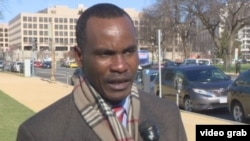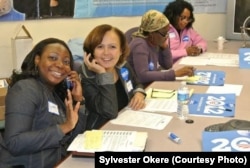Africans are one of the fastest-growing immigrant groups in America, and many are turning to politics as they navigate the complexities of a new society.
African immigrants represent a small share of the U.S. population, but their numbers have been doubling every decade since 1970.
In 2013, there were 1.8 million African immigrants living in the U.S., a huge increase from 80,000 in 1970, according to a 2015 Pew Research Center survey. The foreign-born Africans living in the U.S. in 2013 accounted for 4.4 percent of America's immigrant population that year.
But the immigrants, coming from countries all across the African continent, have varied backgrounds and hold extremely diverse political views, said Nii Akuetteh, executive director of the African Immigrant Caucus.
The most common countries of origin for foreign-born Africans are Nigeria, Ethiopia, Egypt, Ghana and Kenya. Some, particularly those from Ethiopia, resettled in the U.S. because of conflicts in their native countries.
Political priorities
Although his group's interests are varied, Akuetteh said the African Immigrant Caucus' primary political priority is to encourage the next U.S. administration to provide greater support to the democratic process in Africa.
Akuetteh told VOA that African immigrants must “put the heat on the presidential candidates to stop supporting African dictators,” particularly those in Egypt, Rwanda, Uganda and Ethopia.
There are other dictatorships in Africa, Akuetteh said, but ending U.S. support in those four dictatorial regimes would pressure others in Africa to pursue a democratic form of government.
Sylvester Okere, president of the United People for African Congress, an umbrella organization that works to get Africa-born residents involved in U.S. politics, said economic issues are most important to them.
“Everybody came here for what I call ‘power opportunity’ and connections,” Okere told VOA.
Many African immigrants in the U.S. make their living as entrepreneurs, so Okere wants the next president to create opportunities for minority businesses by “removing roadblocks in a bureaucratic system that hinders people” from being able to pursue their objectives.
He said he thought presumptive Democratic presidential nominee Hillary Clinton would best represent the interests of African-born residents in the U.S.
“There’s only one candidate who is really working hard to unite everybody, while the other person [presumptive Republican presidential nominee Donald Trump] wants to throw people out” of the U.S., Okere said.
Akuetteh said his organization wouldn't decide whether to support Clinton or Trump until the candidates responded to a questionnaire about their positions on important issues.
Immigration issue
Immigration is another “huge issue” for African immigrants, Akuetteh said.
Recent political rhetoric has included calls for a ban on Muslims entering the U.S. and construction of a wall on the U.S.-Mexico border. Africa-born residents “share all those anxieties” over the possibility of being forced out of the U.S., Akuetteh said.
Most members of the African diaspora came to the U.S. legally through various immigration programs. While most are permanent residents or citizens, others have work or educational visas.
U.S. Census Bureau statistics show Africa-born residents are more educated than the overall U.S. immigration population, with 41 percent having at least one college degree, compared with 28 percent for the immigration population as a whole.
The most popular destinations for Africa-born residents are New York City, metropolitan Washington, Los Angeles, Atlanta, Georgia, and Minneapolis, Minnesota.





